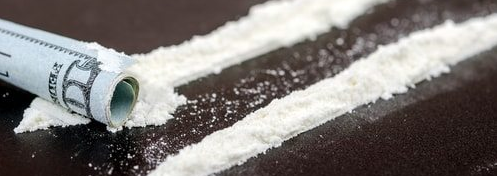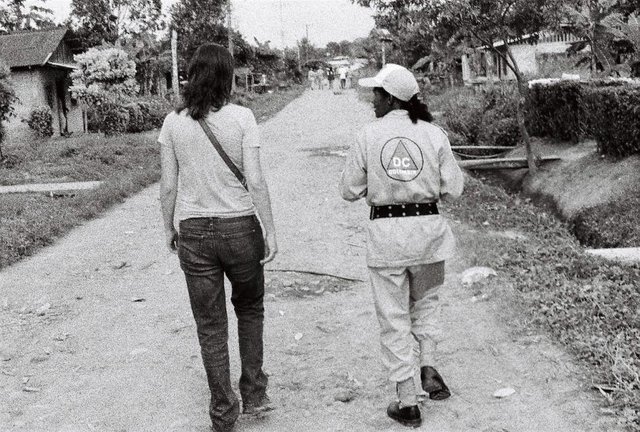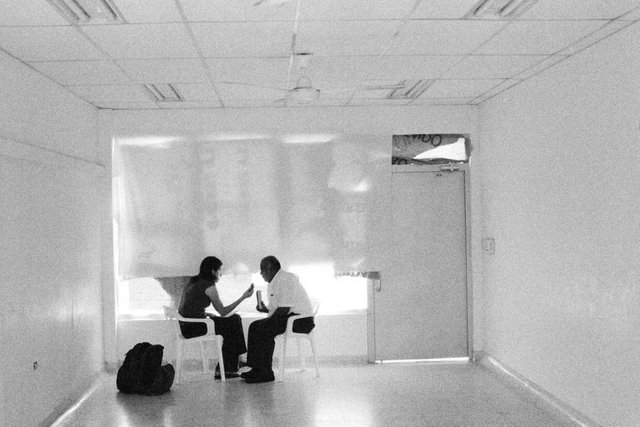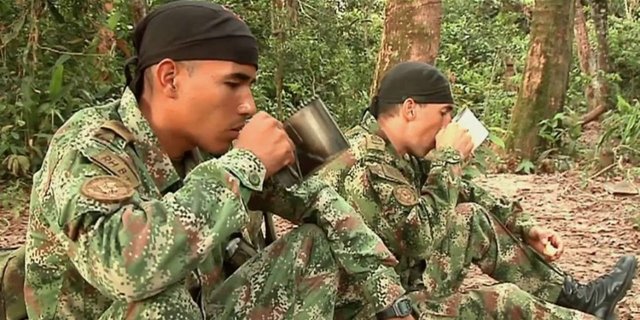Narco State of Colombia is the Most Corrupt Country in South America Including Its Military

Source: Human Rights Watch
Interview: Murder and Corruption in Colombia
New Book Details the Bloody Rise of Paramilitaries With Government Ties
by Amy Braunschweiger • March 18, 2018
When people think about violence in Colombia, the drug kingpin Pablo Escobar or the Revolutionary Armed Forces of Colombia's (FARC) guerrillas might come to mind. But fewer know about the paramilitary forces that killed, tortured, and raped their way across the country starting in the late 1990s. While the paramilitaries portrayed themselves as "self-defense" forces, fighting the guerrillas, they were also among the country's biggest drug traffickers. Over time, it became clear that they were colluding with significant sectors of Colombia's military, wealthy business people and about 30 percent of the country's Congress. Amy Braunschweiger talks with Maria McFarland Sanchez-Moreno about her new book "There are No Dead Here," which details the reign of the paramilitaries and their continuing influence.
McFarland, formerly the Colombia researcher at Human Rights Watch, is now executive director of the Drug Policy Alliance, a US organization working to end the "war on drugs."

Maria McFarland Sánchez-Moreno of Human Rights Watch walks alongside a civilian protection officer in a small town near Tumaco, in the state of Nariño, Colombia, a day after a massacre by successors to the paramilitaries in the town, July 2009. © 2009 Stephen Ferry
When I finished working in Colombia in 2010, I had a lot of stories that I hadn’t been able to tell. I had met many brave ordinary Colombians who stood up to the paramilitaries and other armed groups, but many people didn’t know about their stories or courage.
Who are the paramilitaries?
The paramilitaries had been private armies formed by wealthy people – both to fight guerrillas and to further the wealthy people's interests -- to take land, to kill trade unionists or others who got in their way, and so on. From the beginning, many of them worked closely with major drug traffickers, including Pablo Escobar. In fact, after Escobar's death they became the biggest drug traffickers in the country, and many had been members of or close to the Medellin Cartel.
Your book tells the story of the paramilitaries through three people – the activist Jesus Maria Valle, who was later killed, the lawyer Ivan Velasquez, and the journalist Ricardo Calderon. Why these three?
Because I could tell the story of the rise of the paramilitaries and how they made their way into high levels of the government through them. The three of them together ended up exposing the links between the paramilitaries and the government.

Diro César González, journalist and publisher of the bi-weekly newspaper, La Tarde, gives testimony to Maria McFarland Sánchez-Moreno.
I had gotten to know Velasquez pretty well working in Colombia. While I was investigating Colombia, he was a Supreme Court assistant justice investigating Congress. He became a target of a smear campaign by then-President Alvaro Uribe—most of the congresspersons under investigation belonged to his coalition, and one was his cousin—and was falsely accused of trying to frame the president for murder. It turned out that the paramilitaries had gone to the presidential palace to plot against Velasquez and that Colombia’s intelligence service was spying on him.
Valle was an activist from the state of Antioquia, where Medellin is located, and a friend of Velasquez, who at the time was Antioquia's chief prosecutor. Valle was this incredibly brave man who spoke out about paramilitary abuses. He knew he was going to be killed, people were begging him to flee, but he felt he had to protect his people. And no one else dared to say what he did at the time – that the military and, in his view, the Antioquia governor's office were either complicit with these crimes, or looking the other way.
Then I chose Calderon, because as a journalist he reported on the smear campaigns against Velasquez. He's an incredible powerhouse who's deeply driven to tell the truth about what's going on.
Throughout the book, you keep coming back to a massacre in the remote village of El Aro. Why?
It happened in October of 1998, after Valle had been warning authorities for months about the paramilitaries entering his home region of Ituango, the part of Antioquia where El Aro was located. In the days before the massacre, people from El Aro reached out to Valle to for help. Valle called the military, the police and the governor's office, but no one helped.
The paramilitaries go into the town, kill 17 people including a young boy, rape women, then loot and burn the town down. They steal thousands of heads of cattle and drive them many miles for all to see. The paramilitaries are there for days, and no security forces come in to stop it. Witnesses in El Aro even see a helicopter owned by the military flying overhead. So El Aro became a powerful example of how paramilitaries were operating with, at a minimum, tacit acceptance by parts of the security forces.
Please go to Human Rights Watch to read the entire article on the corruption in Colombia.
Source: Global Security
Colombia - Corruption
December 13, 2017
Corruption is a serious obstacle for companies operating or planning to invest in Colombia. According to the World Economic Forum (WEF) Global Competitiveness Index (2016-2017), corruption is the second most problematic factor affecting competitiveness, following high tax rates. The NGO Transparency International reported that Colombian citizens’ perception of the level of corruption in the country remained high in 2016, and a February 2017 Gallup poll showed it as the number one problem facing Colombia according to Colombians polled. In 2016 Colombia ties for 90 out of 176 countries in the Transparency International rankings, falling from 83 in 2015.
The law provides criminal penalties for official corruption, and the government generally implemented these laws effectively, although officials sometimes engaged in corrupt practices without punishment. The World Bank's worldwide governance indicators reflected that government corruption was a serious problem. Revenues from transnational organized crime, including drug trafficking, exacerbated corruption.
Former La Guajira governor Juan Francisco "Kiko" Gomez Cerchar was tried for his alleged involvement in death threats made in 2014 against four persons investigating political party corruption and ties to illegal armed groups, for links to former paramilitary groups, and for involvement in various killings. On 17 November 2016, he was convicted of crimes including aggravated homicide, attempted murder, and trafficking of weapons in connection with the killings of political leader Yandra Brito, her husband Henry Ustariz, and driver Wilfredo Fonseca.
In January 2016, media reported 12 persons were arrested for alleged corruption related to ICBF contracts, including the former ICBF regional director in Barranquilla Department and an active CNP officer. According to media reporting, an estimated COP 1.755 trillion ($600 million) was embezzled. Additionally, two ICBF officials were arrested in August for their alleged involvement in a corruption scandal related to contracts worth millions of dollars for the care of minors and pregnant women within the ICBF's "Cero a Siempre" strategy. The two officials faced charges for crimes, including embezzlement, procedural fraud, forgery of private documents, falsifying a public document, and malfeasance.
A special investigative unit of the Supreme Court of Justice, charged with investigating members of congress and senior government officials, reported that since 01 January 2016, it opened one investigation against a former senator; the investigation. During the same period, the unit opened 59 investigations against former governors and 28 against sitting governors but won no convictions in the cases.
The Attorney General's Office reported that for the year 2016 through September, it had investigated 19 attorneys, one comptroller, and 16 other senior government officials. In addition, as of August 25, the Attorney General’s Office was investigating 75 cases of corruption, of which 71 were in the preliminary investigation phase and four had been brought to trial.
In December 2016, one of the biggest corporate corruption cases in history broke when the U.S. Department of Justice announced that Brazil-based construction conglomerate Odebrecht had paid USD 800 million in bribes over six years regionally, including USD 11 million in Colombia, in order to win infrastructure contracts. The case has generated intense media coverage in Colombia as several senior members of both the Santos and Uribe administrations have come under investigation.
Please go to Global Security to read the entire report.
What is 921 metric tons of cocaine worth on the global markets with a current global demand of 600 metric tons? It is worth roughly $320 billion in a global industry. With global cocaine demand and production like this, and cocaine sales made easy through the dark web, does anyone actually think that in Colombia FARC will come to any kind of a "peace agreement"?
The US military are in Colombia working out agreements including embedding Colombian military officers inside the US Marine's Southern Command. Then Colombian Marine Corp are awarding US Marines despite the rampant corruption inside the Colombian military? The Colombian military also have para militaries inside their military protecting the drug rat line trade out of Colombia often going through Venezuela? It's a tactical move so that if the cocaine moving out of Colombia is interdicted inside Venezuela, the US media can then point their finger at Venezuela to blame Venezuela for being a "Cartel of the Suns" in elaborate US-based media smears of Venezuela. Colombia is nothing more then the extension of US foreign policy on supporting the drug trade providing Colombia with an estimated $500 million in "foreign aid" mostly used to keep Colombia's military and para militias operating to maintain uninterrupted drug shipments. Was this $5 million embezzled by the Colombian military part of the $500 million yearly "foreign aid" provided to Colombia?
Source: Colombia Reports
Colombia admits military embezzled more than $5M in supplies
by Jarrod Demir • April 21, 2018

Colombia's defense minister on Friday admitted that the armed forces are being investigated for corruption that saw more than $5 million embezzled from defense funds.
The ministry delivered a document detailing how there were 21 corruption investigations submitted to the Prosecutor General's office between 2011-2018.
The alleged $5 million shortfall came in the way of false bank transactions and irregularities in contracts and inventories, such as fuel and even a coffee machine.
The Logistics Agency of Colombia's armed forces, which is responsible for feeding soldiers, is at the center of the investigation.
Agency director Colonel Oscar Jaramillo informed that 19 people were being investigated for irregularities in the handling of funds, including several high-ranking officers.
More: Colombia's military embezzled food stocks intended for soldiers in war zones: report
Please go to Colombia Reports to read on the corruption inside the Colombian military.
News appeared in 2007 making the claim corruption was cleaned up inside Colombia's military. Nothing could be further from the truth when in 2018, Colombia's rampant corruption was a hot topic in Colombia's presidential vote. Considering cocaine production in Colombia is the highest on record, there is little evidence to suggest corruption has been cleaned up, if anything drug-related corruption is far worse than it has ever been. In 2014, CNN ran a news story on January 12, 2012 on how Colombia was "busting drug cartels". If all these drug cartels were "busted", how is it today that in 2017 Colombia has produced more cocaine than any other time in its history, while 2018 looks like it will be another record breaking year for cocaine production in Colombia. The CNN news article was just cover.
Colombia continues to break records for cocaine production, report says
Colombia Criticized for Promoting Corrupt Army Generals
The DEA is operating in Colombia without constraint or transparency. Considering the US military's past involvement in the drug trade, is there any reason to think the US Marines operating in Colombia as well as PMCs aren't involved in some way in the drug trade? The US has been sending PMCs to Colombia at least since 2003 to fight against the narcotics trade. How can this be when Colombia produced more cocaine in 2017 compared to any other year? The DEA operating in Colombia is part of the problem. The financial rewards are too great to compromise with this latest conduct by the DEA operating in Colombia with this latest incident only being a small portion of what is actually going on. At one point, the DEA was serious about Colombia's drug trade, one agent in 1994 called Colombia a "narco-democracy" with nothing much having changed since. This is the case today especially after the Cali drug cartel was broken up with Pablo Escobar being killed and the drug ratlines consolidated.
Source: APNewsBreak
APNewsBreak: DEA's Colombia post jarred by misconduct probes
October 4, 2018

BOGOTA, Colombia (AP) — New turmoil has roiled the U.S. Drug Enforcement Administration's high-profile office in Colombia, where at least three agents have left in recent months amid investigations into alleged misconduct, including accusations that one passed secrets to drug cartels and another used government resources to hire prostitutes.
The DEA's top-ranking official in South America, who was brought in three years ago in the wake of a scandal involving agents participating in sex parties with prostitutes, is under investigation after the agency received an anonymous complaint saying he directed Colombian drivers working for the U.S. Embassy in Bogota "to procure sex workers," according to a copy of the complaint obtained by The Associated Press and one current and one former law enforcement official. The officials spoke to the AP on the condition of anonymity because they were not authorized to discuss an ongoing investigation.
Richard Dobrich, a regional director who is retiring from the DEA next month to take a private sector job, said in a statement and interview with the AP that the complaint is without merit and he would have to be a "complete idiot" to have anything to do with prostitution given the office's history. He also denied his departure has anything to do with the accusation.
"There is nothing to this — zero," Dobrich said of the anonymous complaint, adding he wants another probe into how it got out. Dobrich said he believes this “attempted assassination on my reputation" is a setup, perhaps by a disgruntled former DEA employee.
Dobrich said investigators from the Justice Department's Office of Inspector General interviewed him at his office in Colombia last month and seized his phone as a matter of routine. Dobrich said he was later told by an investigator that no misconduct was found, but neither the OIG nor the investigator named by Dobrich would comment on the status of the investigation.
DEA spokeswoman Mary Brandenberger did not respond to emailed questions about Dobrich's departure but wrote that the agency "takes very seriously any allegations of wrongdoing or misconduct by our employees."
Please go to APNewsBreak to read the entire article on the DEA's outstanding work (snicker, snicker) in Colombia.
Was this Marine Corp officer buying prostitutes in Colombia compromising his security? Must be a real party in Colombia for the Marines with sex parties, lot's of alcohol and drugs. The DEA are up to all kinds of nefarious activity in South America largely with no constraint or transparency. Does it seem like the US Marines are going to be deployed against Venezuela to protect the drug ratlines out of Colombia and big oil interests connected to Venezuela?
A Marine colonel was drugged in a Bogotá pub, then robbed. Now he's forced to retire
Secret DEA Sting in Bolivia Confirms Evo Morales' Fears About U.S. Meddling
If readers want to know more about the background of what's going on in the world including in Venezuela, this is all being pushed forward by a US global military strategy. So while Thomas P.M. Barnett can discuss the high murder rate in Caracus, Venezuela which is paltry compared to let's say the murder rate in Chicago, he can be vindictive in his assessment of Venezuela because it is a military strategy. Therefore the reasoning goes, anything goes against a targeted country like Venezuela. Whatever we see happening in Venezuela now including the buildup of military assets it should be considered as part of the US military's "global military project". The only problem with this scenario though is that China and Russia will not allow this to continue as the world is broken into a bipolar world.
Venezuela: living in a gangsta' paradise
The US military project for the world
Related:
Pincer Military Movement Moving Into Position on Venezuela
Venezuela is not going to be the victim of US "Humanitarian Aid"
The Duplicity (Triangular Trade: Drugs; Sex; Guns)
Posted from my blog with SteemPress : https://www.abeldanger.org/narco-state-of-colombia-is-the-most-corrupt-country-in-south-america-including-its-military/